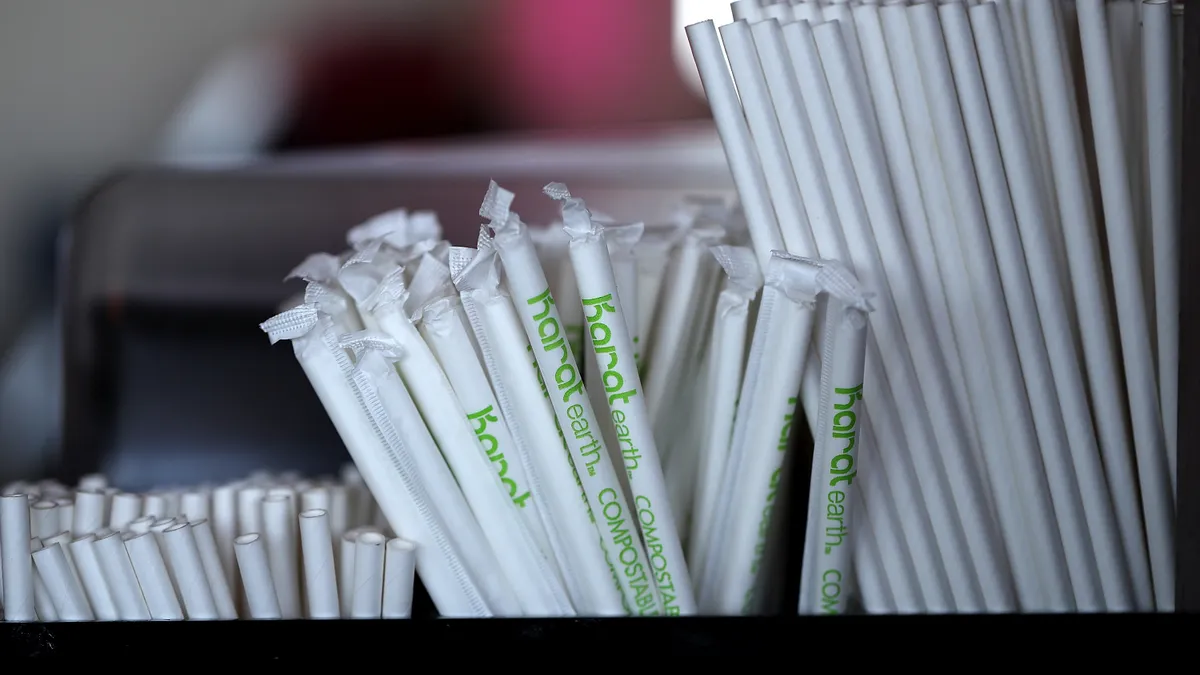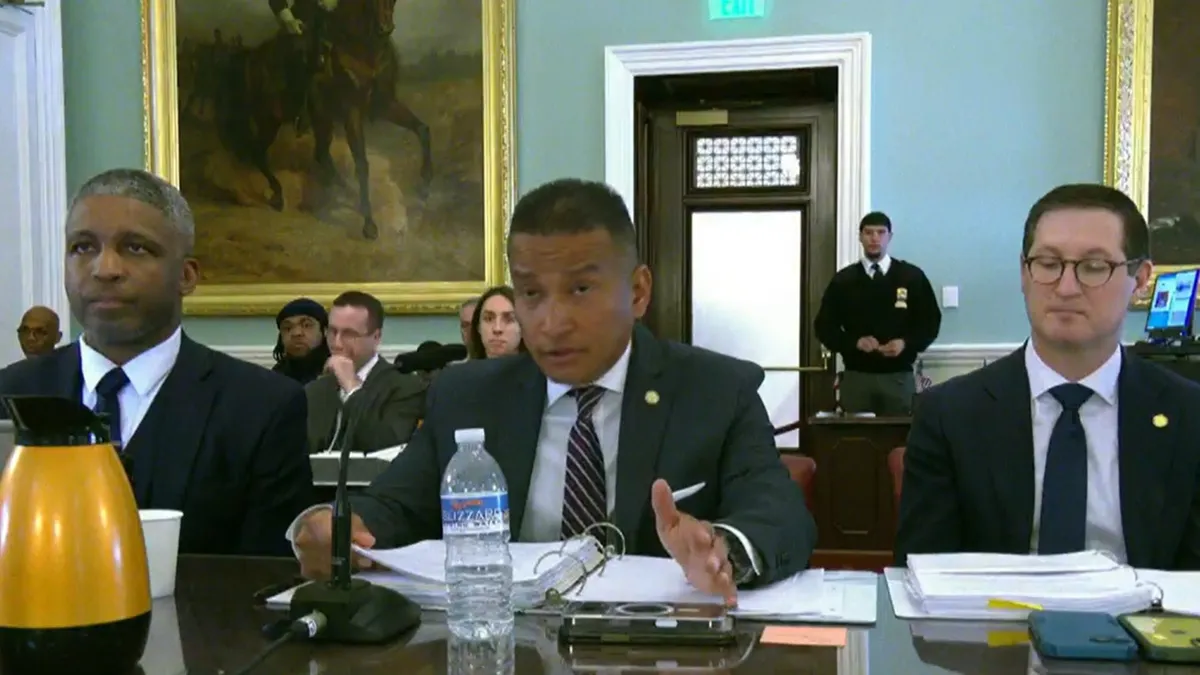Editor’s Note: Waste and recycling are inherently local issues in the United States, and we’re looking for new ways to highlight how these stories fit into broader trends. Send us your tips or feedback at waste.dive.editors@industrydive.com.
New York City Council passes bill restricting plastic straws
Efforts to limit plastic bags in New York City have been hotly contested for years, but the passage of a new bill this week restricting plastic straws is seen as a sign of growing acceptance for plastics reduction policies.
The bill, Intro. 936, passed the New York City Council 43-4 on Wednesday. If Mayor Bill de Blasio signs it into law as expected, city food establishments must only provide plastic straws upon request effective Nov. 1. Straws made from alternate materials must also be available, and plastic stirrers and splash sticks will be banned entirely.
First introduced in 2018, the bill languished for a time due to the pandemic and the departure of its original sponsor. But once it was brought up for a final vote there was less debate than for prior plastics policies. Jennie Romer, a legal associate with the Surfrider Foundation who has played a key role in crafting local single-use plastics legislation, said it’s the latest sign of changing attitudes.
“In that time period between when the bill was being initially introduced and now I think we've seen a whole lot more acceptance of regulation of single-use plastic,” said Romer, comparing it to a local 2016 vote to limit bags that was one of the closest in council history. “There's still a lot of drama going on with bags in New York State, but with straws there isn't quite as much pushback. I think that's in part because of the mechanism of the law and also just the public acceptance.”
Straws have been emblematic of the debate over plastics reduction and personal choice in recent years, even coming up in the presidential campaign. In 2019, then-Sen. Kamala Harris proposed banning straws, while former President Donald Trump sold them at a high mark up on his campaign website.
Politics nor industry pushback were part of the recent discussion in New York, where trade groups did not engage like they have on bag legislation. The Plastics Industry Association did not respond to a request for comment prior to publication.
“This is a common sense bill that all of the sectors were behind,” said Eric Goldstein, senior attorney at the Natural Resources Defense Council. “You can look at it as a litter problem, you can look at it as a water pollution and marine environment problem, and you can look at it as a climate problem.”
Representatives from the hospitality industry and the disability community, two key groups often affected by such policies, touted the policy’s passage in a release from Council Member Helen Rosenthal this week.
If the bill is signed, New York would join many other major cities including Los Angeles, San Francisco and Seattle in passing a policy to limit straws. California also has a statewide policy, with one in New Jersey set to take effect next year and a related bill introduced at the state level in New York.
Looking ahead, Goldstein said “we’re still on the low-hanging fruit” when it comes to passing more local plastics policies. Next up is a pending bill to limit takeout utensils and related items, which he believes can pass with similar ease. Romer similarly described the straw bill as a “first step” toward broader efforts, but believes New York’s move can also send a message in the meantime.
“There's still going to be a lot more cities that see New York City moving forward and are more likely to move forward with the laws on their own,” she said. “Plus just the amount of people in New York City and the amount of restaurants, that in and of itself will be a lot of plastic that's not being consumed in the first place.”
In other local waste news, the council passed a bill this week requiring the city’s Department of Education to work with school sustainability coordinators on food waste reduction plans. Organics also came up in the first mayoral debate Thursday night. Seven of the eight leading candidates supported citywide organics collection. Andrew Yang, the only holdout, said he does too but wants to scale the program up on a neighborhood basis first.
More updates from around the country:
-
The City of Memphis, Tennessee, is seeking a new solid waste director amid a personnel changeup. Memphis’ solid waste director of less than two and a half years, Al Lamar, no longer works for the city. The news follows Memphis’ struggles with trash collection this year, which led to the city parting ways with contractor Waste Pro. (The Commercial Appeal)
-
The Seattle City Council this week approved a plan to raise residents’ solid waste rate (which is coupled with water, sewage and drainage utilities) more than 20% by 2026 to help account for rising labor costs and major capital projects tied to environmental mandates, among other reasons. A hike is planned for businesses as well. (The Seattle Times)
-
Although the pandemic delayed some of Boston’s efforts to make progress on its zero waste goal (80% recycling by 2035, and 90% by 2050), steps to grow drop-off site programs for textiles and organics are poised to help. (Waste Dive)
-
Houston Mayor Sylvester Turner indicated this week the city may spend some of its American Rescue Plan stimulus dollars toward heavy trash collection and other solid waste services. The proposed budget for fiscal year 2022 would increase solid waste allocations 2.8% and add five full-time employees. (The Houston Chronicle)
-
Cleveland, which has not had curbside recycling since spring of 2020, may open the opportunity for opting into a revamped recycling program in the coming weeks. (News 5 Cleveland)
-
Janesville, Wisconsin, plans to launch a feasibility study into whether parts of the city’s landfill could be leveraged for solar power generation. (GazetteXtra)
-
Berkeley, California, is expanding curbside collection and recycling of mattresses through a pilot program supported by the Mattress Recycling Council, which it hopes will simultaneously cut back on illegal dumping and help meet sustainability goals. (The Daily Californian)
-
California Gov. Gavin Newsom this week proposed $1.5 billion for a cleanup plan that would in part address trash problems along highways. Some of those funds would be distributed to local governments for existing programs that organize cleanups, Los Angeles Daily News reports. Meanwhile, leaders in Pickens County, South Carolina, are trying a new approach for cleaning up at least a quarter, or up to 300 miles, of the county’s roads. The county has earmarked $75,000 to pay charities and civic groups $250 per mile of litter cleanup.
Municipal biogas project advocates detail successes, barriers
Municipalities represent the bulk of early adopters of the 2,000 operational biogas systems in the U.S., according to the American Biogas Council. A virtual event presented by ABC this week brought together professionals from California, Kansas, Pennsylvania and New York to share about projects they’ve undertaken and the environment in which they’re operating.
Sarah Deslauriers, representing the California Association of Sanitation Agencies, noted state policies in California meant to divert organic waste from landfills and mitigate greenhouse gas emissions have been key incentives for biogas efforts.
“We’re seeing a lot of interest in codigestion at municipal wastewater treatment plants and that's actually what spurred on the State Water Resources Control Board's codigestion capacity analysis; they wanted to understand how can wastewater treatment plants play a role in this, we know there's existing anaerobic digestion capacity available,” said Deslauriers.
On the opposite coast: “I am jealous of California’s advocacy in this area,” said Paul Kohl of the Philadelphia Water Department, noting they’re currently working with ABC to pursue a potential statewide organics diversion mandate in Pennsylvania. “We are a city agency, and without state-mandated policies, which we do not have, this becomes a very difficult proposition.”
Likewise, moderator Brendan Hannon of the New York City Department of Environmental Protection noted NYC operates a codigestion program. “There are bureaucratic hurdles, there are logistical hurdles … it's the philosophy of how bureaucracies work, and whose responsibility are these new things that pop up that may not have been historically something a water and wastewater utility did in terms of collecting food waste -- that is not water.” Still, “I am optimistic that with good people working on it, those bureaucratic ribbons will be cut right through,” Hannon said.























